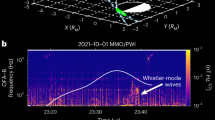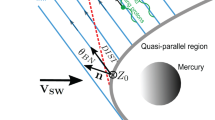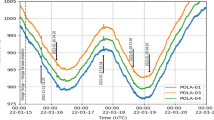Abstract
THIS communication reports two new whistlers discovered in the very-low-frequency radio noise data from Injun 3 satellite. This satellite carried a very-low-frequency receiver with a magnetic loop antenna oriented so as to detect the component of the wave magnetic field which is propagating perpendicular to the geomagnetic field. The pass band of the very-low-frequency receiver was about 0.5–7 kc/s. Altitudes ranging from 237 km to 2,785 km are covered by the Injun 3 very-low-frequency data.
This is a preview of subscription content, access via your institution
Access options
Subscribe to this journal
Receive 51 print issues and online access
$199.00 per year
only $3.90 per issue
Buy this article
- Purchase on Springer Link
- Instant access to full article PDF
Prices may be subject to local taxes which are calculated during checkout
Similar content being viewed by others
References
Gurnett, D. A., and O'Brien, B. J., J. Geophys. Res., 69, 1 (1964).
Gallet, R. M., Proc. Inst. Rad. Eng., 47, 211 (1959).
Smith, R. L., J. Geophys. Res., 66, 2578 (1961).
Stix, T. H., The Theory of Plasma Waves (McGraw-Hill Book Co., Inc., New York, 1962).
Author information
Authors and Affiliations
Rights and permissions
About this article
Cite this article
PFEIFFER, G., GURNETT, D., SHAWHAN, S. et al. Non-Eckersley-law Whistlers observed at Equatorial Latitudes with Satellite Injun 3. Nature 210, 827–828 (1966). https://doi.org/10.1038/210827a0
Issue Date:
DOI: https://doi.org/10.1038/210827a0
This article is cited by
-
Riser Whistlers at a Ground Station at Low Latitude
Nature Physical Science (1971)
Comments
By submitting a comment you agree to abide by our Terms and Community Guidelines. If you find something abusive or that does not comply with our terms or guidelines please flag it as inappropriate.



